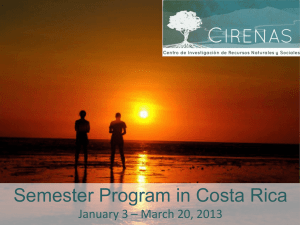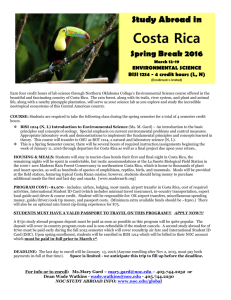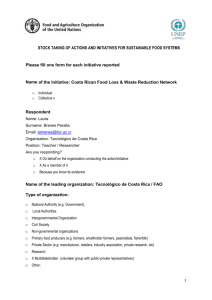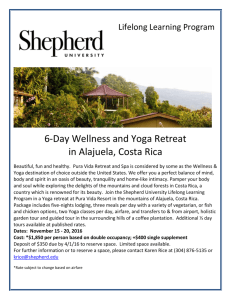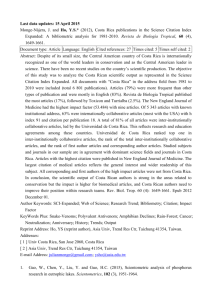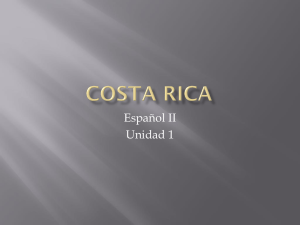Honors Experiential Learning Project Proposal Form – Global
advertisement
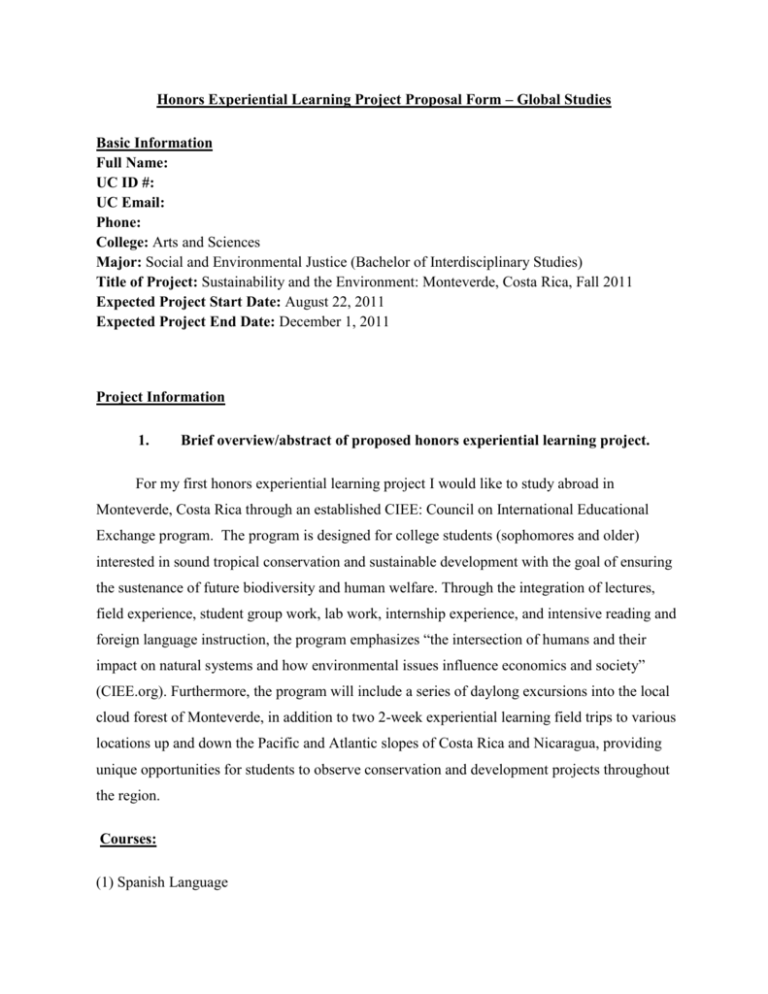
Honors Experiential Learning Project Proposal Form – Global Studies Basic Information Full Name: UC ID #: UC Email: Phone: College: Arts and Sciences Major: Social and Environmental Justice (Bachelor of Interdisciplinary Studies) Title of Project: Sustainability and the Environment: Monteverde, Costa Rica, Fall 2011 Expected Project Start Date: August 22, 2011 Expected Project End Date: December 1, 2011 Project Information 1. Brief overview/abstract of proposed honors experiential learning project. For my first honors experiential learning project I would like to study abroad in Monteverde, Costa Rica through an established CIEE: Council on International Educational Exchange program. The program is designed for college students (sophomores and older) interested in sound tropical conservation and sustainable development with the goal of ensuring the sustenance of future biodiversity and human welfare. Through the integration of lectures, field experience, student group work, lab work, internship experience, and intensive reading and foreign language instruction, the program emphasizes “the intersection of humans and their impact on natural systems and how environmental issues influence economics and society” (CIEE.org). Furthermore, the program will include a series of daylong excursions into the local cloud forest of Monteverde, in addition to two 2-week experiential learning field trips to various locations up and down the Pacific and Atlantic slopes of Costa Rica and Nicaragua, providing unique opportunities for students to observe conservation and development projects throughout the region. Courses: (1) Spanish Language (2) Costa Rican Natural History (3) Conservation and Sustainability Internship, (4) Tropical Conservation Biology and Policy, (5) Sustainability: Environment, Economy, and Society 2. Clearly state how each of the following elements will be exhibited in your work (refer to the first two pages of this document with the full description of what is expected in each of these areas). 1. Substantial Content and Quality within Global Studies Theme I believe this experience will relate to all four global studies objectives very closely and am confident that my time within the program will significantly strengthen my global literacy while additionally emphasizing other key foundational concepts of the honors global studies theme such as global interdependence, cultural appreciation/sensitivity, and global citizenship. In fact, the program, due to its specific focus on sustainability, and therefore actively and intentionally emphasizes the interdependence of global economies, political systems, and the environment and referencing the Monteverde region (home of the Latin American sustainability movement) and Costa for in-depth case studies. As is stated in the CIEE program handbook, "There is no better way to study the interface between tropical conservation biology and rapid development than to immerse yourself in it. And Costa Rica offers a great example of the challenges for biodiversity, the economy, and society that arise in developing tropical countries. In the CIEE Program in Sustainability and the Environment at Monteverde, students will travel with an academic team to learn firsthand about Costa Rica from the people who live there. They will understand better the obstacles faced by Costa Rican societies to advance economically while preserving their world-renowned biodiversity" (CIEE, 5). Thus, the courses I plan to take (also listed above) are international in focus will emphasize both Latin American culture, social and environmental issues, and governmental policy as they relate to global issues and concerns. Furthermore, I will have the opportunity to learn alongside individuals from a variety of different cultures (students from all over the world are listed as program alumni) and to live with a local Monteverde family. According to my research, Monteverde- though admittedly rather small- is home to a large number of biologists, artists, writers and environmentalists from around the globe and is, thereby, known for its cultural diversity. Thus, I believe there will be ample opportunity to interact with, learn from, and develop appreciation for different cultures. I am additionally certain that I will develop a better understanding of my own role as a global citizen as I partake in an internship in which I will be working with local activists as a participant within a local organization‘s mission for sustainability. I am, perhaps, most excited about these opportunities, in particular, as they will encourage me to build strong relationships within the Monteverde community, thereby forming a more concrete understanding of Costa Rican culture and lifestyle. Finally, I think that simply the length of my time abroad will be important in achieving all of the global studies learning objectives. Living and working in Costa Rica for a total four months will surely allow me to experience and learn much more than I could learn from any book or individual course in Cincinnati and will provide me with a more developed global perspective that I may possess for the rest of my life. 2. Connection to Academic Goals and Theories As a student currently pursuing an interdisciplinary degree, I have a wide range of academic interests and goals. As a participant in the Bachelor of Interdisciplinary Studies (BIS) program, I have collaborated with faculty to design my own degree. Entitled Social and Environmental Justice the degree combines elements of environmental science, economic theory, international human rights, photojournalism, and foreign language (most specifically, Spanish) in order to address the current dilemma of how to actively pursue international development that is socially, environmentally, and economically sustainable. Thus, I am dedicated to an education as diverse as the sustainability movement itself in preparation for both "pale green" and "deep green" occupations (as they are dubbed in the field), ranging from nonprofit social work positions to environmental science research. Therefore, when I discovered The CIEE Monteverde program in Sustainability and The Environment I was ecstatic to have found a study abroad program which directly relates to and complements my rather specific present and future academic goals in their entirety. After all, there is perhaps no better place to learn about sustainability than Costa Rica which, according to my research so far, is known internationally as an example of successful tropical conservation and sustainable development. According to national statistics, National Parks now make up over 12% of the nation‘s holdings, and private plus national protected areas collectively comprise more than 20% of Costa Rica. Moreover, several decades of initiatives in the governmental and private sectors in the realm of ecotourism, environmental services payments, and carbon neutral agriculture have positioned Costa Rica as an epicenter of the green movement. Therefore, as has been written by environmental journalist John Pearson, “The ecological wealth, progressive initiatives, and a stable government make Costa Rica a fascinating example for what is possible in the world" (Our World: Costa Rica, 7). While the United States has certainly been a good example of the problems that stem from unsustainable cultures and societies, my studies within the US have yet to discover many feasible resolutions. Therefore, it will be refreshing and enlightening to study a culture that seems to have found the solutions. Furthermore, although I am already fairly certain that I want to work within the sustainability movement in one way or another I have yet to work within a non-profit/non-governmental organization; and, as it just so happens, these organizations make up a very significant portion of the sustainability workforce. Therefore, it is extremely important that I experience what it is like to work within the non-profit/NGO sector where I will almost certainly be interning. Furthermore, from this experience, I hope to establish a stronger understanding of the political, social, and economic conditions that enabled Costa Rica to develop into such a sustainable and equitable country and, perhaps most importantly, a better understanding of what it will take to establish a more successful sustainability movement in the United States. Additionally, the program will allow me to immerse myself within the Costa Rican culture and Spanish language. According to the program information, there are nine potential levels of Spanish offered to students through the Centro Panamericano de Idiomas. Taught by Costa Rican locals, the courses will be extremely intensive and will not exceed four students per class. This intensive instruction, in combination with language immersion, should ensure that I will finally significantly improve in my understanding Spanish and hopefully even achieve fluency. This has always been a personal academic goal and, accordingly, is a significant part of my BIS degree. Thus, I am taking my enrollment in and preparation for the program very seriously, to say the least. In addition to my own personal studies into the Spanish language, I am currently taking summer courses in Spanish. Furthermore, in addition to completing the less extensive preparatory research required by the program, I am currently conducting (and will continue to conduct) a lot of my own personal research into the Costa Rican culture and conservation movement. Below I have listed books that I have discovered and plan to read in my own research initiative, in addition to a multitude of other potential sources suggested within the CIEE program handbook. To recap, my experience abroad in the CIEE Monteverde program will enrich my college education overall, allowing me to work towards several important academic objectives such as (1) experiencing and understanding a new culture, (2) becoming fluent in the Spanish language, (3) experiencing what it would be like to work within the sustainability movement as a member of a nonprofit organization/business/NGO, (4) developing a concrete understanding of how NGOs and nonprofit organizations function, and (5) learning more about conservation/sustainability as well as biodiversity. Ergo, it truly appears to be the perfect program for my personal, academic, and professional interests which I believe will truly enrich my life overall. Preparatory Research: Sources for Personal Research Green Phoenix : restoring the tropical forests of Guanacaste, Costa Rica 
Allen William, 2001 Biodiversity conservation in Costa Rica: learning the lessons in a seasonal dry forest Edited by G. W. Frankie, Alfonso Mata, S. Bradleigh Vinson 2004 The Green Republic: a conservation history of Costa Rica By Sterling Evans, 1999 The Quetzal and the Macaw : the story of Costa Rica's national parks David Rains Wallace, 1992 Costa Rica : the Forests of Eden Schafer, Kevin. 1996 Costa Rica : an Ecotraveller's Guide by Hannah Robinson, 2006 Costa Rica by Lonely Planet Publications, 2010 and/or Let's go. Costa Rica, 2009 Green Encounters: Shaping and Contesting Environmentalism in Rural Costa Rica by Luis A. Vivianco, 2006 Monteverde: Ecology and Conservation of a Tropical Cloud Forest edited by Nalini Nadkarni, Nathaniel T. Wheelwright, 2000 Suggested Reading List for Course Preparation Brown, L. R. 2001. Eco-Economy: Building an Economy for the Earth, W.W. Norton and Co., New York Ehrenfeld, J. R. 2008. Sustainability by Design: A subversive strategy for transforming our consumer culture, Yale University Press, New Haven Hawken, P. 1993. The Ecology of Commerce: A declaration of sustainability, Orion Books, Ltd. and HarperCollins Publishers, New York Pollan, M. 2006. The Omnivore's Dilemma: A Natural History of Four Meals. Penguin Press, New York Terborgh, J. 1989. Where have all the birds gone? Essays on the biology and conservation of birds that migrate to the American tropics. Princeton University Press, Princeton, NJ Vandermeer, J. H., Perfecto, I., and Shiva, V. 2005. Breakfast of Biodiversity: The Political Ecology of Rain Forest Destruction, Food First Books Wilson, E. O. 2003. The Future of Life. Vintage Books Duerr, D. J. 2010. Saving Life: Solutions for Halting the Global Decline, The Ark Initiative, Pinedale, WY Suggested Reading List on Cultural Adaptation Citron, J. 1996. Short-Term Study Abroad: Integration, Third Culture Formation and Reentry, NAFSA: Association for International Educators. Kepets, D. 1999. Back in the USA: Reflecting on Your Study Abroad Experience, NAFSA: Association for International Educators. Kohls, R. 2001. Survival Kit for Overseas Living: For Americans Planning to Live and Work Abroad, Intercultural Press. Storti, C. 2001. The Art of Crossing Cultures (Second Edition), Intercultural Press. Suggested Websites: References for Program-Related Topics www.foodfirst.org (Food First Organization) www.earth-policy.org (Earth Policy Institute) www.wri.org (World Resources Institute) www.mbdc.com (McDonough Braungart Design Chemistry) www.inec.go.cr (Instituto Nacional de Estadisticos y Censo de Costa Rica) www.fao.org (Food and Agriculture Organization of the United Nations) www.un.org/millenniumgoals (United Nations Millennium Development Goals) www.footprintnetwork.org (Global Footprint Network) http://wwf.panda.org/about_our_earth/all_publications/living_planet_report (World Wildlife Foundation, Living Planet Report) www.SaveLifeNow.org (source of Saving Life: Solutions for Halting the Global Decline) References on Traveling/Monteverde, Costa Rica http://www.studentuniverse.com/ (Student Universe) http://travel.state.gov (U.S. State Department Bureau of Consular Affairs) www.usc.edu/dept/overseas/links.html Resources for Colleges and Universities in International Exchange www.miusa.org Mobility International U.S.A. .washingtonpost.com/wp-srv/inatl/americas.htm The Washington Post – Americas www www.costaricainternetdirectory.com Costa Rica Internet Directory www.cdc.gov U.S. Centers for Disease Control and Prevention www.lonelyplanet.com/dest/cam/costa.htm Lonely Planet – Costa Rica www.usc.edu/dept/overseas/links.html (The Overseas Studies Office at the University of Southern California (USC) 3. Initiative, Independence and Creativity Although this experience does take advantage of an already-established program, it took quite a bit of research and personal initiative to ensure the program’s successful incorporation into my current academic program and to achieve acceptance into the CIEE organization- all of I completed on my own. Additionally, I feel it is worth mentioning that the decision to leave my family and friends behind as I travel to Costa Rica for four months has, by itself, required a lot of independence on my part. Although I have traveled by myself in the past, this experience will be unique, as I have never traveled outside of the country for an extended length of time by myself. Furthermore, it will take a lot of independence and initiative to learn to successfully communicate in Spanish, requiring me to get over my inhibitions and to actively speak in Spanish to strangers, despite my poor grammar and accent. Moreover, although I cannot predict where or how my internship will go, it seems very likely that I will be placed within a position that will require an abundance of initiative, independence and creativity. As listed on the CIEE web page, the internship program is designed to “enhance understanding of biological conservation and rural development and become sensitized to how different sectors of Costa Rican society approach sustainability issues. Students learn about the mission and day-to-day operations of their agency, develop personal and interpersonal skills, and gain new technical abilities and knowledge.” Finally, my plans to reflect and disseminate (explained below) the benefits of my experience abroad throughout the University of Cincinnati and the Cincinnati community will require quite a bit of creativity, independent research, and personal initiative throughout the entirety of the process. 4. Reflection & Dissemination I plan to actively reflect on my experience throughout my time abroad, in the form of journaling and careful photographic and video documentation. This will provide for more adequate personal reflection, allowing me actively assess my daily experiences abroad. Furthermore, I plan to use this documentation to contribute to the eventual dissemination of my experience throughout UC’s campus and the surrounding community. This dissemination will take place in the form of two different projects, the first being a well-developed and engaging memory book (convertible into “zine” format) that will represent the experience from a more personal, subjective perspective; the second being an electronic photo essay that will more professionally and objectively evaluate what I learned and observed abroad for dissemination online. These projects will incorporate my personal skills and interests in an effort to communicate my thoughts officially and publicly in two very different but equally effective formats. The memory book/zine will provide hands-on documentation of my thoughts, feelings, and personal growth in the form of pictures and descriptions, while also including advice/tips that I picked up in my own preparatory research and experiences abroad. This will be aimed at influencing other potential travelers by demonstrating the value and importance of receiving a global education, while also providing insight into necessary preparatory steps such as researching and determining the quality of study abroad programs, and applying/gaining university credit from study abroad programs. The final product, in the form of several hard copies, will be offered for use in the UC Honors and UC International offices. The photo essay will focus more specifically on scholarly observations and conclusions about conservation efforts in Costa Rica and will incorporate information from my own personal research in addition to the courses and internship offered by the CIEE program. This will include audio recordings of interviews with local inhabitants, students, and teachers in addition to video and photographic footage of the information I present. The goal is for the photo essay to encapsulate everything that the memory book does not, providing more in-depth evaluation of what I gained academically. Furthermore, it will provide the means for electronic dissemination and will be offered, upon completion, to the UC Honors and UC International web sites. In conclusion, I believe these dissemination techniques will be extremely beneficial for me personally as well as (I hope) for the university overall, allowing me to reflect on my experience both subjectively and objectively as well as in different formats. 5. Advisor (list the person’s name, title, and contact information) Karen Masters Resident Director c/o CIEE APDO 43-5655 Monteverde, Puntarenas Costa Rica Tel: (506) 2645-7626, -5187 Mobile phone: (506) 8354-7703 Email: karenlmasters@gmail.com, KMasters@ciee.org 6. Budget : $14,295 Note: this is before the subtraction of the tuition remission that I receive through my mother; the application of tuition remission to the study abroad program is not yet final but, upon finalization, would reduce some of the cost. Educational Costs (direct cost of education charged uniformly to all students; including $300 nonrefundable Participation Confirmation Fee) $11,673 Housing and Meals $1,850 Medical Insurance $77 Total $13,600 This fee is listed by CIEE to include the following (some of which are not included above): “…tuition, scientific equipment and lab fees, housing, all meals, local transportation, optional on-site airport meet and greet, full-time leadership and support, orientation, cultural activities, local excursions, field trips, national park entry fees, outdoor camping equipment, a comprehensive student handbook, pre-departure advising, and a CIEE iNext travel card which provides insurance and other travel benefits.” (source: CIEE.org) However, this fee does not include: Total airfare: $695.36USD (including taxes and insurance) Thus, making the final total: $14, 295



